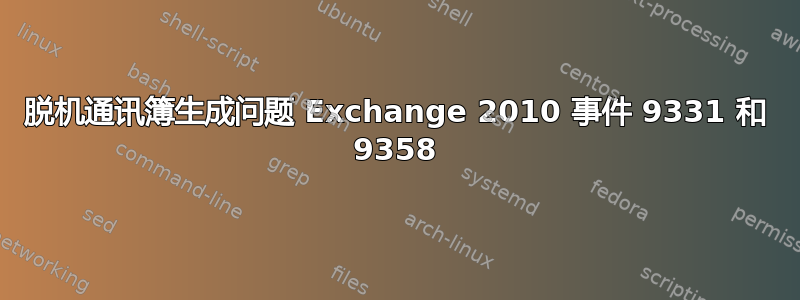
我正在执行从 2003 到 2013 的双跳迁移。我已经迁移到 Exchange 2010,但我认为公共文件夹和复制存在问题。所有公共文件夹都适用于客户端,每个人都可以访问,但我在 Exchange 服务器上的事件日志中收到一些错误。
我担心这些会在我从 2010 迁移到 2013 时造成问题。再次确认用户没有看到错误,只有服务器。Exchange 2003 已退役并关闭,新的 2010 服务器是一台具有所有角色的单一服务器。
目前困扰我的两个事件是事件 9331 和 9358(来源 MSExchangeSA),它们与 OAB 的生成有关,并且每当我尝试更新 OAB 或其更新计划运行时就会出现。
Event ID: 9331
OABGen encountered error 8004010f (internal ID 501080f) accessing the public folder database while generating the offline address list for address list '\Global Address List'. - \Default Offline Address List
Event ID: 9358
OALGen could not update the timestamp of the previous version of offline address list '\Global Address List'. Please check earlier event log messages for the specific error. - \Default Offline Address List
我已经尝试了很多次,但它们仍然出现,要么仍然有问题,要么我没有理解某些事情。
我已经尝试过http://www.experts-exchange.com/Software/Server_Software/Email_Servers/Exchange/Q_26320925.html其中的回应表明
- 添加注册表项“OAL post full if diff failed”,值为 1
- 在 Exchange 数据库的客户端设置中选择了默认脱机通讯簿
- 确保服务正在运行
- 重新启动了Microsoft Exchange 地址簿服务和Microsoft Exchange 文件分发服务。
- 检查了 C:\Program Files\Microsoft\Exchange Server\V14\ExchangeOAB 和 C:\Program Files\Microsoft\Exchange Server\V14\ClientAccess\OAB 中是否有带有 GUID 前缀且充满 .LZX 文件的文件夹
http://social.technet.microsoft.com/Forums/en-US/e4a302f7-fc67-4c31-a429-0a19f1eafaa9/oab-issues表明存在权限问题,并且将 iss_usrs 添加到 web.config 文件,但我没有 iss_usrs 组,但经过身份验证的用户、系统和管理员都有权访问。
我还遇到了一些其他小问题,这些问题列在我的 spiceworks 帖子中(我无法列出,因为我是新成员,不能放两个以上的链接),这些问题与 exchange 2003 服务器有关,该服务器仍然被引用进行复制,并且仍然存在于 ADSI 编辑中,我关注了一篇关于从中删除旧 exchange 服务器的帖子CN=配置,DC=DOMAIN,DC=LOCAL > CN=服务 > CN=Microsoft Exchange > CN=EXCHANGE_ORG > CN=管理组使用 ADSI 编辑
我很抱歉发了这么长的帖子,但我想确保所有的信息都在这里
更新时间:2014/03/28
好的,我四处探索后发现了一个问题,但不确定是否相关。运行 Get-MailPublicFolder 命令时,一些返回的结果显示警告。
WARNING: The object company.com/Microsoft Exchange System Objects/Conference Calendar has been corrupted, and it's in
an inconsistent state. The following validation errors happened:
WARNING: Property expression "Conference Calendar" isn't valid. Valid values are: Strings formed with characters from A
to Z (uppercase or lowercase), digits from 0 to 9, !, #, $, %, &, ', *, +, -, /, =, ?, ^, _, `, {, |, } or ~. One or
more periods may be embedded in an alias, but each period should be preceded and followed by at least one of the other
characters. Unicode characters from U+00A1 to U+00FF are also valid in an alias, but they will be mapped to a best-fit
US-ASCII string in the e-mail address, which is generated from such an alias.
据我所知,这是因为 exchange 2010 不喜欢名称中的空格,而 exchange 2003 则从不介意。我现在正在研究这些变化,看看是否有什么不同


